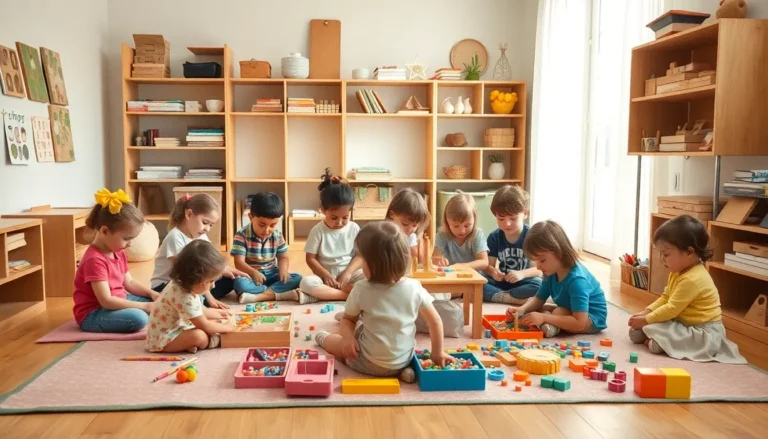Table of Contents
ToggleIn a world where kids can level up faster than you can say “game over,” monitoring their gaming habits has never been more crucial. While virtual adventures can spark creativity and teamwork, they can also lead to some eyebrow-raising moments—like when your child thinks a balanced diet consists of pizza rolls and energy drinks.
Importance Of Monitoring Kids Gaming
Monitoring kids’ gaming is essential in ensuring a balanced approach to media consumption. Engaging with children about their gaming habits promotes awareness of both benefits and risks.
Understanding The Impact Of Gaming
Gaming impacts children’s development in various ways. Positive effects include improved problem-solving skills, enhanced creativity, and teamwork experiences. However, excessive gaming can lead to negative outcomes like social isolation or unhealthy lifestyles. Parents should observe gameplay duration and types of games to determine potential influences on behavior. Industry reports indicate that children spend an average of 7 hours per week gaming, significantly affecting daily routines and responsibilities.
Recognizing Age-Appropriate Content
Recognizing age-appropriate content helps parents guide gaming choices. Each game is designed for specific age groups, often rated by organizations like the Entertainment Software Rating Board (ESRB). Ratings provide clear guidance on game suitability based on themes, violence, and complexity. Understanding these ratings enables parents to select games that align with their child’s maturity level. Studies show that exposure to inappropriate content can lead to desensitization and aggressive behavior, making informed choices critical for healthy gaming experiences.
Tools For Monitoring Kids Gaming

Effective tools exist for monitoring kids’ gaming habits. These tools help parents track gameplay and encourage responsible gaming.
Software Solutions
Software solutions provide parents with insights into their children’s gaming activity. Many applications offer detailed reports on playtime, game types, and interactions with other players. Popular tools like Qustodio and Net Nanny enable parents to manage screen time effectively. They can block inappropriate content and set gaming limits based on age. Using these tools, parents can foster a healthier gaming experience, ensuring kids engage in games that develop skills while avoiding harmful content.
Parental Control Features
Parental control features play a crucial role in managing gaming environments. Most gaming consoles and platforms, such as Xbox and PlayStation, include built-in parental controls. These features allow parents to restrict game access based on ratings and monitor in-game purchases. Many mobile devices also offer comprehensive settings to limit screen time and block specific apps. Customizable alerts notify parents when children exceed set gaming limits. By utilizing these controls, parents can guide gaming choices and promote a balanced lifestyle for their children.
Setting Up Boundaries
Setting boundaries around gaming helps promote a balanced lifestyle for children. Establishing clear guidelines fosters healthier habits while providing structure.
Establishing Time Limits
Setting time limits on gaming sessions supports healthy routines. Parents can determine appropriate daily playtime based on age and individual needs. Many experts recommend limiting recreational screen time to no more than one hour for children aged 6 and older. Tracking playtime helps parents ensure kids engage in other activities, such as outdoor play and family time. Incorporating timers can aid children in understanding when their gaming session will end. Reflecting on gaming limits leads to discussions about responsible gaming habits, encouraging children to adhere to the established boundaries.
Creating A Gaming Schedule
Creating a gaming schedule helps balance screen time with other essential activities. Parents can designate specific times for gaming, allowing children to anticipate their play sessions. Assigning time for homework, chores, and family events ensures a well-rounded routine. Scheduling gaming can reduce conflicts over playtime and helps parents monitor gameplay effectively. Utilizing calendars or apps to manage gaming sessions visually reinforces the importance of time management. Together, these strategies encourage children to prioritize responsibilities alongside leisure activities, promoting overall well-being.
Engaging With Your Child
Engaging with a child about their gaming experiences fosters a supportive environment where healthy dialogues can thrive. Parents benefit from having open discussions, encouraging children to express their thoughts and feelings on the games they play. Conversations about gameplay can unveil insights into their interests and motivations. When children feel heard, they are more likely to share concerns about what they encounter in gaming. Asking specific questions about their favorite characters or game mechanics can ignite meaningful discussion. Recognition of their input leads to improved understanding, allowing parents to address any apprehensions.
Understanding their gaming interests provides insights into their preferences and personalities. Parents can start by exploring the genres or themes that captivate their child, whether it’s adventure, puzzles, or strategy games. Observing gameplay can reveal the skills they develop, such as teamwork or critical thinking. By acknowledging the positive aspects of their favorite games, parents can encourage balance in exploring different activities. Discovering what excites children about gaming can guide parents in recommending other beneficial experiences. Maintaining awareness of current trends, such as popular gaming titles or platforms, further supports engaged conversations.
Monitoring kids’ gaming habits is vital for fostering a healthy balance between play and other essential activities. By engaging with children about their gaming experiences and utilizing effective tools, parents can guide their gaming choices while promoting positive habits. Setting clear boundaries and discussing game content helps ensure children enjoy the benefits of gaming without falling prey to its potential pitfalls. Encouraging open dialogue not only strengthens parent-child relationships but also empowers kids to make informed decisions about their gaming. Ultimately, a proactive approach to monitoring can lead to a more enriching and balanced gaming experience for children.







